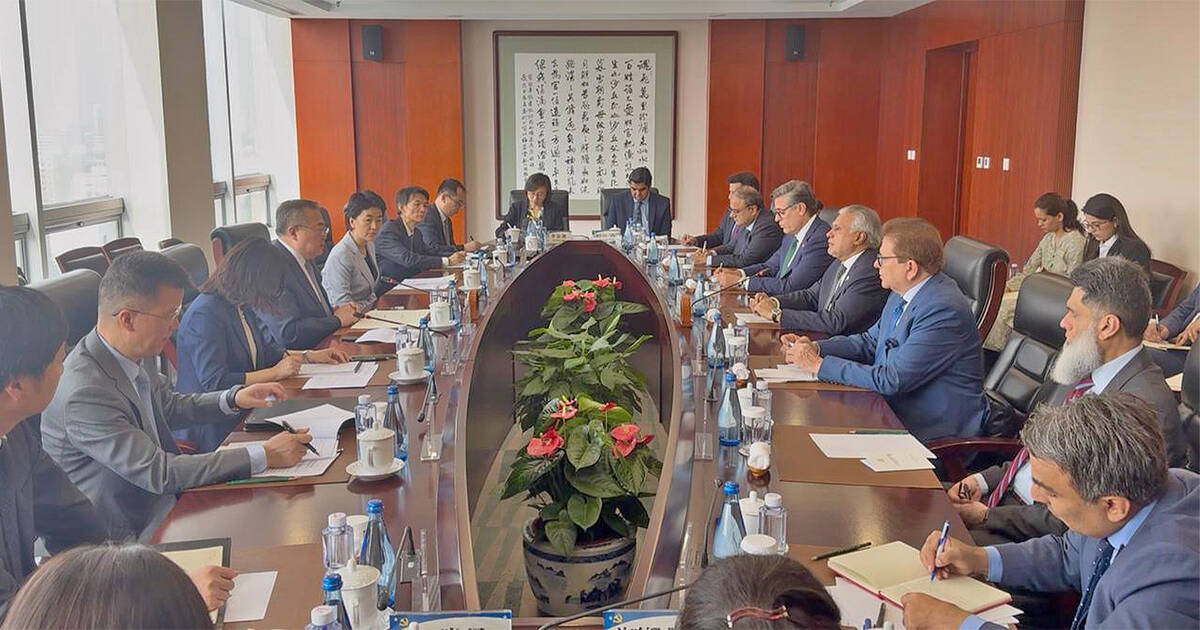ISLAMABAD: Prime Minister Shehbaz Sharif on Tuesday met with Saudi Arabia’s Crown Prince Mohammed bin Salman on the sidelines of the One Water Summit in Riyadh, Sharif’s office said, adding the two leaders agreed to further boost bilateral trade and investment ties between the two countries.
This was Sharif’s fifth meeting with the Saudi Crown Prince over the past six months, according to the Pakistan PM’s office. Crown Prince Mohammed said this was the evidence of the “genuine love and affection that connect the peoples of the two countries.”
Sharif last met the Saudi Crown Prince on the sidelines of the Future Investment Initiative in Riyadh in late October, when the two leaders discussed recent agreements, including investments in agriculture, semiconductor manufacturing, and energy, worth $2.8 billion.
“Both leaders agreed that it was now necessary for the two countries to bring about a qualitative change in their economic, trade and investment relationship,” Sharif’s office said in a statement.
“The Crown Prince stressed that it was important to ensure that Pakistan and Saudi Arabia enhance meaningful cooperation that will bring about economic growth and prosperity in Pakistan.”
Pakistani and Saudi businesses signed 27 memorandums of understanding (MoUs) worth $2.2 billion on Oct. 10 during the Saudi investment minister’s visit to Islamabad. On Oct. 30, while Sharif was visiting Riyadh, Saudi Arabia announced it had enhanced the number of business agreements from 27 to 34 and increased their value to $2.8 billion.
Sharif’s office said on Monday that seven out of 34 MoUs signed with Saudi Arabia had been actualized into agreements worth $560 million. In April, the Kingdom also pledged to expedite a $5 billion investment portfolio for Islamabad.
During Tuesday’s meeting in Riyadh, both leaders expressed satisfaction at the pace of progress of the implementation of the agreements regarding investment in Pakistan, according to Sharif’s office. The prime minister reiterated his invitation to Crown Prince Mohammed to visit Pakistan at his earliest convenience.
“The Crown Prince responded that he was looking forward to his visit to Pakistan,” Sharif’s office said.
Pakistan and Saudi Arabia enjoy strong trade, defense and cultural ties. The Kingdom is home to more than two million Pakistani expatriates and serves as the top source of remittances to the cash-strapped South Asian nation.
ONE WATER SUMMIT
Earlier on Tuesday, Sharif called for transfer of technology, financing and international cooperation to ensure sustainable management of water for all as he addressed the One Water Summit in Riyadh.
The summit, a joint initiative of Saudi Arabia, France, Kazakhstan and the World Bank, aimed for high-level political commitments to promote global cooperation and a coherent international approach toward water resource management.
Addressing the summit, Sharif said water was lifeblood of the planet, which transcended political boundaries, connected nations and fostered shared ecosystem, which was why his country attached great importance to transboundary cooperation.
“At the global level, I would submit for your kind consideration a number of steps to overcome water-related challenges. First, we need international cooperation and collaboration to ensure availability, sustainable management of water and sanitation for all,” he told attendees at the summit.
“Second, exchange of knowledge and expertise as well as transfer of technologies on innovative water management must be prioritized. Third, adequate funding for climate-resilient infrastructure and overcoming financing gap remains critical for climate-vulnerable countries.”
He appreciated the Kingdom of Saudi Arabia, France, Kazakhstan and the World Bank for the initiative, saying the world required “strong political will and global leadership to overcome the water crisis.”
“We must also focus on framework for transparency, data-sharing and regional cooperation to avoid conflicts and promote water-sharing,” the Pakistan premier said.
“We must invest in skills development, research and institutional strengthening to tackle water challenges at national and global levels.”
Sharif detailed steps taken by his government to ensure water security and climate-resilience, saying Pakistan was proud of joining this initiative and looked forward to providing all possible support in achieving its goals.
“As leaders, policymakers and custodians of the future, it is our duty to ensure that these rivers, lakes and aquifers that have nourished civilizations for centuries must not be reduced to tales of the past,” he added.



















